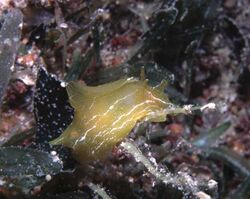Biology:Syphonota geographica
| Geographic sea hare | |
|---|---|

| |
| Scientific classification | |
| Domain: | Eukaryota |
| Kingdom: | Animalia |
| Phylum: | Mollusca |
| Class: | Gastropoda |
| Subclass: | Heterobranchia |
| Clade: | Euopisthobranchia |
| Clade: | Anaspidea |
| Superfamily: | Aplysioidea |
| Family: | Aplysiidae |
| Genus: | Syphonota H. Adams & A. Adams, 1854 |
| Species: | S. geographica
|
| Binomial name | |
| Syphonota geographica (A. Adams & Reeve, 1850)
| |
| Synonyms | |
| |
Syphonota geographica, or the geographic sea hare, is a species of sea slug or sea hare, a marine opisthobranch gastropod mollusk in the family Aplysiidae, the sea hares.
This is the only species within this genus, in other words, Syphonota is a monotypic genus.
Distribution
This species is found in the Indo-West Pacific oceans, off Western Australia, and the Mediterranean, and Red seas.
Description
Syphonota differs from the other Aplysiidae genera, through the position of the rhinophores (head tentacles), which are further back, almost between the parapodial lobes. The parapodia, fleshy winglike outgrowths, come to a noticeable high point at the top of the animal.
The body coloration is whitish to green, with brown specks and a complicated network of white lines (hence the name 'geographica').
The maximum recorded length is 170 mm.[1]
Habitat
This sea hare lives in lagoons and bays on sandy substrates.
Minimum recorded depth is 6 m.[1] Maximum recorded depth is 7.5 m.[1]
References
- ↑ 1.0 1.1 1.2 Welch J. J. (2010). "The "Island Rule" and Deep-Sea Gastropods: Re-Examining the Evidence". PLoS ONE 5(1): e8776. doi:10.1371/journal.pone.0008776.
- Bebbington A. (1974) Aplysiid species from East Africa with notes on the Indian Ocean Aplysiomorpha (Gastropoda: Opisthobranchia). Zoological Journal of the Linnean Society 54(1): 63-99.
- Turgeon, D.; Quinn, J.F.; Bogan, A.E.; Coan, E.V.; Hochberg, F.G.; Lyons, W.G.; Mikkelsen, P.M.; Neves, R.J.; Roper, C.F.E.; Rosenberg, G.; Roth, B.; Scheltema, A.; Thompson, F.G.; Vecchione, M.; Williams, J.D. (1998). Common and scientific names of aquatic invertebrates from the United States and Canada: mollusks. 2nd ed. American Fisheries Society Special Publication, 26. American Fisheries Society: Bethesda, MD (USA). ISBN:1-888569-01-8. IX, 526 + cd-rom pp. (look up in IMIS) page(s): 122
- Mollo E., Gavagnin M., Carbone M., Castelluccio F., Pozone F., Roussis V., Templado J., Ghiselin M.T. & Cimino G., 2008: Factors promoting marine invasions: A chemoecological approach, Proceedings of the National Academy of Sciences 105(12): 4582–4586
- Rosenberg, G., F. Moretzsohn, and E. F. García. 2009. Gastropoda (Mollusca) of the Gulf of Mexico, pp. 579–699 in Felder, D.L. and D.K. Camp (eds.), Gulf of Mexico–Origins, Waters, and Biota. Biodiversity. Texas A&M Press, College Station, Texas
External links
Wikidata ☰ Q7662982 entry
 |

